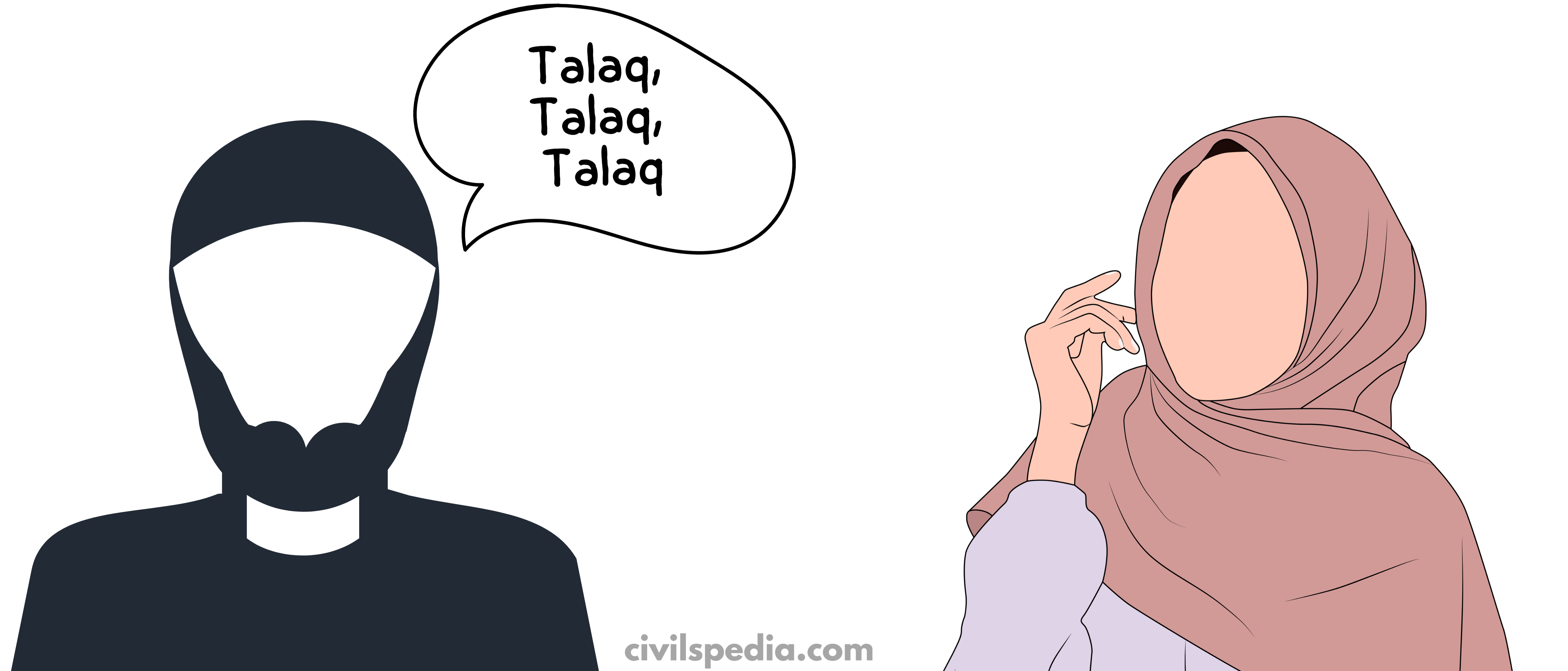Triple Talaq
This article deals with ‘ Triple Talaq .’ This is part of our series on ‘Society’, which is an important pillar of the GS-1 syllabus. For more articles, you can click here.
Introduction

- Triple Talaq (also known as Talaq-e-Bidat) is a practice in which a man pronounces ‘talaq’ thrice in a sitting, or through the phone, or writes in a talaqnama or a text message and the divorce is considered immediate and irrevocable, even if the man later wishes to reconciliation.
- The only way for the couple to go back to living together is through Nikah Halala and then return to her husband. In Nikah Halala, a divorced Muslim woman is required to wed another man and then obtain a divorce.
- Then and only then will she be qualified to remarry her ex-husband.
- In Shayara Bano v. Union of India (‘Triple Talaq case’), Supreme Court declared Triple Talaq as un-Islamic and “arbitrary”.
Why should Triple Talaq be banned?
- Triple Talaq is not Essential Practice of Islam: It is not an Islamic Practice but social practice of Arab Society which has gradually crept into Islam.
- Islamic countries such as Egypt, Iraq, Jordan, Kuwait, Morocco, Sudan, Syria, UAE and Yemen have made the concept of Triple Talaq unconstitutional & India must follow suit.
- It infringes on the Right to Equality and the Right to Life of women.
- Committee on the Status of Women (2012) has also recommended banning Triple Talaq and polygamy.
Arguments against Supreme Court’s interference in Triple Talaq
- In Narasu Appa Mali’s (1952) Case, Supreme Court held that personal laws are not ‘laws for the purpose of Article 13.’ Hence, they can’t be scrutinised for violation of fundamental rights violations.
- Religious practices are safeguarded under Article 25 of the Constitution.
Muslim Women (Protection of Rights on Marriage) Act
Timeline

| 1986: Shah Bano Case | Shah Bano Case was to decide whether the relief extended to divorced women under CrPC, 1973, applied to Muslims too. The Constitution bench decided that it extended to Muslim women as well. |
| 1986 | Shah Bano Act/Muslim Women (Protection of Rights on Divorce) Act was enacted by the Rajiv Gandhi government to overturn the Supreme Court order. It held that divorced women were entitled to maintenance for the period of iddat (3 lunar cycles/menstruations) only. |
| 2001 | Daniel Latifi Case – Maintenance for a period of (only) iddat was challenged in the Supreme Court for violating Articles 14 & 21. Supreme Court held that this doesn’t violate Articles 14 & 21 as an intelligible difference can be made in this case. |
| 2017 | Shyara Bano Case: Supreme Court declared Triple Talaq to be unconstitutional. |
| 2019 | The government introduced the Muslim Women (Protection of Rights on Marriage) Act. |
Provisions of Muslim Women (Protection of Rights on Marriage) Act
- Triple Talaq will not nullify the marriage.
- The act makes Triple Talaq a criminal offence with imprisonment of up to 3 years.
- The act shall be cognisable and non-bailable (i.e. police officers can arrest without a warrant.)
- Principle of Locus Standii don’t apply: Complainant can be anybody – not just wife.
- The Muslim woman who has been subject to Talaq is allowed to seek subsistence allowance from their husband for both herself and her dependent children. The Magistrate will determine how much the allowance will be.
Main issues with Act
- Act converts a civil wrong into a criminal wrong as marriage is a civil contract.
- Against the Doctrine of Proportionality and hence infringes on the Right to Equality. Under IPC, a 3-year jail term is for crimes like rioting.
- Against principles of natural justice: Triple Talaq doesn’t nullify the marriage. Hence, when a crime is not committed, how can a person be punished for the act of crime?
- Issue of implementation: The is challenging to implement, especially in cases of oral triple divorce given by husbands when no one other than the couple was present
- Rise in divorces and abandonment: Issues remain as no husband, on his return from jail, is likely to retain the wife on whose complaint he had gone to prison.
In favour of the Criminalization of Triple Talaq
- Triple Talaq has never been sanctioned, even in Islamic scripture. In Pakistan and Bangladesh too, which are Islamic countries, Triple Talaq is a criminal offence (with imprisonment of up to 1 year ).
- The government’s intent is not to punish. The government argues that if nobody gives Triple Talaq, nobody gets punished.
- Supreme Court judgment of 2017 recognized the discriminatory nature of Triple Talaq. The Muslim Women (Protection of Rights on Marriage) Act 2019 offers Muslim women recourse and access to the protection of the law from the practice of arbitrary instant divorce.
